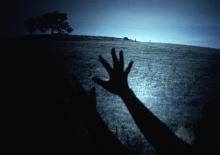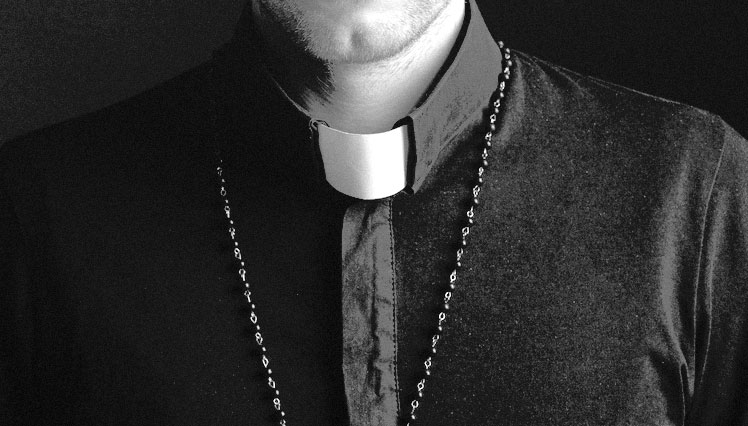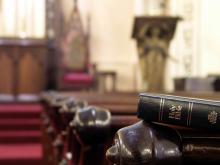Belief
JUST A FEW dozen pages into Faith, Doubt, and Other Lines I've Crossed, evangelical pastor Jay Bakker pens what may be the best explanation for the Christian emphasis on church community that I've ever encountered. Noting that doubt can be "hard and scary," Bakker writes: "That's why we have one another, why we have community. We can go through those days of doubt together. I wouldn't be who I am today if it weren't for the people who have been there with me as I question everything."
Many writers have grappled with the challenge that doubt poses for religious believers. But in this honest, searching, and ultimately uplifting book, Bakker pulls doubt out of the shadows where many believers wrestle with it on their own and instead presents it as a reality that Christian communities can and should address together.
Bakker's approach to the often-taboo topic of questioning—or, as he puts it, "the sense that faith is crap, life is meaningless, there is no God, the Bible is a fraud, Jesus was just a charismatic man turned mythological figure if he existed at all"—is shaped by his childhood in a Pentecostal environment that left no room for doubt. As Bakker ruefully notes in the book's introduction, "I will probably be 80 years old and still introduced as Jay Bakker, son of Jim and Tammy Faye." That unusual background only provides the impetus, however, and not the substance for this book, which reads mostly as the stream-of-consciousness meditation of a man pushing and pulling at his faith to see if it holds up.

IT'S A STORY that promises to make you believe in God.
A boy, shipwrecked on a lifeboat with a Bengal tiger, repeatedly cheats death and eventually discovers his own self. It's a typical coming-of-age tale, really—except for the whole tiger part.
Life of Pi centers on Pi Patel, the son of a zookeeper, who grows up grasping to understand God. His open heart and willingness to learn lead him from Hinduism to Christianity to Islam. While stranded at sea along with a few escaped zoo animals as company, he continues to explore the meaning of God as he's thrust into dramatic—and at times inconceivable—situations.
Anyone who has read Yann Martel's best-selling book can understand how near impossible it seems to adapt the larger-than-life story into a film—none more so than the person who did just that, screenwriter David Magee. The largest chunk of Pi's journey is a solitary one, save the aforementioned Bengal tiger (named Richard Parker).
In an interview with Sojourners, Magee said he wrote the scenes without any lines for Pi at all, only inserting them where necessary after the fact.

I’ve wrestled for years with a Christian faith that focuses on personal salvation, on many levels, some of which I’m still excavating. First, the emphasis on individual salvation always seemed ironically selfish for a faith that seemed otherwise to be about putting yourself second to others. I also struggled with the idea that Christianity is about getting a certain set of beliefs right, articulating them before a group of peers through a statement of faith and then you were official. Is it really so rote? So didactic? So … human?
All my life, I’ve heard stories of people who felt utterly transformed by their faith proclamation, or at the moment of baptism, in the throngs of prayer or during some particularly stirring worship service. They spoke of these feelings for which I longed. I wanted the mountaintop experience, after which I would never be the same. I wanted to be turned inside-out by God, illuminated by the Holy Spirit with a fire that never subsided. I wanted to feel what all these other Christians claimed to be feeling.
I’ve been to literally thousands of worship services in my life. I’ve been back and forth through the Bible, taken communion more than a thousand times, was baptized, sang the songs, said the prayers, and yes, I’ve had moments when I felt as if God was so close I could nearly reach out and touch whatever it was that I sensed.

 Editor's Note: Kevin Gonzaga tells his story of why he's part of the 20 percent of Americans who identify with "no religion in particular." Find more stories (or share your own) HERE. Read about the study HERE.
Editor's Note: Kevin Gonzaga tells his story of why he's part of the 20 percent of Americans who identify with "no religion in particular." Find more stories (or share your own) HERE. Read about the study HERE.
Three years ago when I arrived at seminary to pursue my calling to fulltime pastoral ministry, one would probably have struggled to find someone in my generation more committed to the ministry and vitality of the local church.
While imperfect, I believed the church was the best hope of the world, and it was better to stay and work toward change than abandon the church and look for greener pastures. A year and a half later, I wrote a blog post explaining that I was no longer a Christian. I fear that this would only deepen the stereotype that seminary is a place where people lose their faith, so I should explain.
The truth is I am one of growing number of people who choose not to affiliate with any organized religion. I am a “none,” and my journey to “none” started a long before I left for seminary. My disillusionment with, and eventual abandonment of, Christianity did not center around one traumatic event that shattered my faith, but rather it was something that coalesced from numerous experiences over a long time.
It really started when I began studying the scriptures for myself in college. I was shocked to find many things I had been taught by the Church were wrong, were not in the Bible, or were even contrary to what the scriptures actually taught.

One-in-five adults in the United States — and a third of adults under 30 — say they have no religious affiliation. The numbers are out in a new report called “’Nones’ on the Rise,” put out by the Pew Forum on Religion and Public Life. That 20 percent of the population is up from 15 percent just five years ago.
But while our church membership rolls may be shrinking, “unaffiliated doesn’t necessarily mean wholly secular,” said senior researcher Cary Funk at the Religion Newswriters Association Conference in Bethesda, Md., on Saturday.
In fact, two-thirds of the 46 million Americans self-identifying as having no religion also say they believe in God. And 21 percent of them say they pray every day. A large portion of this group — 37 percent — say they consider themselves “spiritual but not religious.”
The increase in disaffiliation goes hand-in-hand with an overall lack of trust in American institutions across the board, from the government to the news media, and now, to our houses of worship.
The “nones” overwhelmingly say religious institutions are too concerned with money and power, and 67 percent say they both focus too much on rules and are too involved in politics.

A “creed” is an authoritative expression of belief, and within many religious communities, such statements generally emphasize a core affirmation of faith.
In addition to articulating primary convictions, creeds are used to oppose alleged falsehoods. For example, the Nicene Creed, composed in the fourth century, is a Christian proclamation that – among other things – affirmed the divine nature of Jesus, and was thus directed against those who believed otherwise. The Apostle’s Creed, developed in the first or second century, emphasized the humanity of Jesus, as some groups rejected such notions. While the history of Christianity is filled with numerous creeds, the Apostle’s Creed and Nicene Creed continue to serve as primary declarations of faith for millions of Christians around the world.
...
The following is my attempt to draft a contextual creed. In it I sought to stay within the Trinitarian formula, I stayed within the self-imposed length restrictions (it contains 164 words!), my draft has developed over the course of time, and because I fully acknowledge its many shortcomings and limitations, I will surely alter it may times into the future:

Typcially, cults don’t garner media attention unless they do something really big, like when Heaven’s Gate rose to the public eye in 1997 after 39 members committed mass suicide. And while cults may welcome newcomers openly or warily, it seems they prefer to remain elusive and secretive.
In the feature-length drama Sound of My Voice, Peter Aitken, a 20-something school teacher, is angry at the cultish fanaticism that led to his mother’s death (per her cult’s teaching, she refused to take medicine when she was gravely ill) and turns a cynical eye toward belief patterns he believes distort reality.
Shaped by an experience that left him void of parental companionship, he searches for meaning alone, not knowing what to believe.

Belief in God is slowly declining in most countries around the world, according to a new poll, but the truest of the true believers can still be found in developing countries and Catholic societies.
The “Beliefs about God Across Time and Countries” report, released Wednesday (April 18) by researchers at the University of Chicago, found the Philippines to be the country with the highest belief, where 94 percent of Filipinos said they were strong believers who had always believed.
At the opposite end, at just 13 percent, was the former East Germany.

The Defining Issue Of The 2012 Presidential Race?; We've Got Christmas Wrong, Think Tank Reveals; Interracial Couple Banned From Kentucky Church; In Pictures: How Many Adults Believe In God?; Why Has Inequality Gone Up So Much?; New Bible Includes the Word "Immigrant," Brings Moral Clarity; Sacrifice Yourself To The Golden Calf Of Capitalism.

Abuse at Afghan Prisons. How Catholic Conservatives could turn the GOP presidential race. OpEd: Jesus would not #OccupyWallStreet. OWS is "largely secular." Religious leaders see immigration as "God's Call." OpEd: Alabama new immigration law has unintended consequences. OpEd: Wall Street Worship. Could 2012 be the most ideological election in years? And much more.
My friend, Harry Jackson, said that my ideology isn't "Christian" but I suspect what he really means is that it isn't Republican and that's why he disagrees with the things I have said. It's important for Christians to understand those aren't the same thing. I think Bishop Jackson's economic ideology that is indistinguishable from Republican and Tea Party talking points, but I would rather have a civil discussion together as Christians about our differences; rather than his accusing Christians who don't share his conservative economic opinions as coming from "the councils of Hell." C'mon, Harry. I believe the Bible's teachings on wealth and poverty challenge both Republican and Democratic economic views which, sadly, are both often sold out to the interests of the wealthy and large corporations, when they should be focused on the ones Jesus calls "the least of these." Can we discuss that Harry?
